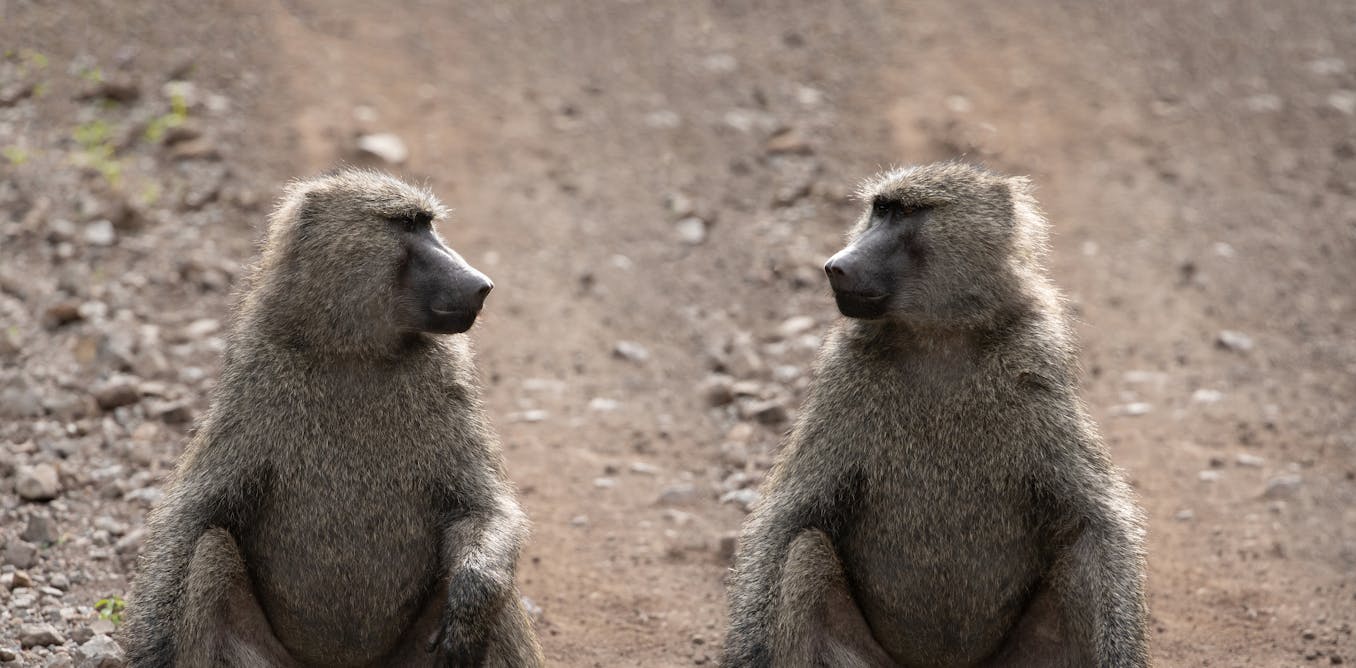- Several pieces about a recent study that suggests homosexuality evolved among mammalian species to reduce conflict “intrasexual violence”;
- A review of a book about the nuclear family, which the reviewer suggests doesn’t take alternatives into account.

There have been reports in various media of a new study of same-sex behavior among mammals, with some entailing speculation about how and why homosexuality would have evolved.
The Conversation, Jenny Graves, 12 Oct 2023: How – and why – did homosexual behaviour evolve in humans and other animals?
Before examining the article, some comments. Of course, the basic questions of why homosexuals exist is a question of evolution and natural selection, which, ironically, the conservatives who rail against homosexuals as unnatural and sinful don’t “believe in.” And yet their concerns are precisely those of the protocols for maximizing tribal and species survival, by having as many children (derived from heterosexual intercourse, of course) as possible. Especially since, all the way until a century or so ago (with modern medicine, which some conservatives don’t believe in either), infant mortality was so high.
There are two questions going on here. First, what forces — genes, hormones, poor family life, or whatever — cause a person to become homosexual? Second, if these tendencies persisted and caused a reduction in reproduction within a given tribe, why didn’t the causes of those tendencies die out, one way or another, to favor of individuals or groups without those genes or hormones, or whatever? That’s how natural selection should work.
The former question is academic. The second question is more interesting: why would any society tolerate individuals who didn’t contribute the reproduction of the next generation?
There have been provisional answers to this for decades. One plausible answer is, that as society has grown more complex, it’s beneficial for some adults in a tribe not to be busy making babies in order to have time to attend to social matters benefiting the entire tribe. (Genetically, the idea is that if a man with no children of his own spends more time keeping his entire immediately family healthy and thriving, his genes will be passed on indirectly through “kin selection.”) Secondarily, that a man or woman has homosexual relationships sometimes doesn’t mean he or she has homosexual relationships exclusively. Remember that early social units were not the “nuclear” family of the past century; and the understanding of where babies came from was not entirely understood. Keep thinking about that.
A second plausible answer concerns the simple observation that sexual intercourse, even among heterosexuals, doesn’t occur *only* for the purposes of having babies. People have sex because it’s fun. (And, because our built-in biological urges drive people, perhaps especially men, to have sex whenever possible — but that’s just another way of saying the same thing.) The vast majority of people has sex far more often than is necessary to turn out a new child every nine months. Why? What other purpose could that serve? Well, it serves to *bond* a couple together indefinitely, as long as the passion lasts, and more or less for as long a time it takes to raise the child. This is something that the Catholic Church, with its prohibition against contraception in order to allow every occurrence of sexual intercourse the potential to create a child, has never learned. It’s stuck in the tribal, Savannah mentality in which procreation was of utmost importance, and sex has no other purpose. Thus its prohibition even against masturbation.
So the current study raises an idea similar to my first plausible answer. The piece in The Conversation begins:
Since gay couples have fewer children, the high frequency of same-sex relationships in humans is puzzling from an evolutionary point of view. Perhaps there are social advantages such relationships confer on a group, or perhaps “gay genes” are selected for other reasons.
A group of Spanish researchers have studied same-sex sexual behaviour and social relationships in more than 250 species of mammals – and in a recent paper in Nature Communications, they conclude it arose independently many times, and is related to other kinds of social behaviour.
… Other hypotheses referenced in the new paper propose that same-sex behaviour has beneficial effects for human groups. One idea is that same-sex relationships are important for forming and maintaining bonds and alliances within the group. This predicts same-sex behaviour should be more frequent in social species than in non-social species.
Alternatively, same-sex behaviour may help to diminish conflict between members of the same sex, and contribute to establishing social hierarchies. If this is so, we would expect same-sex behaviour to be more common in species where aggression and killing among members is also common.
Here’s what seems to be the new idea: in species where males are aggressive among one another, homosexuality among them helps to diminish the threats to social hierarchy that could destroy a tribe.
But reality is complex (sorry conservatives, reality is not black and white), and the article concludes:
Everybody might be right
Establishing that homosexuality confers selective advantages in social species such as humans and other great apes does not rule out other explanations.
There may still be fertility advantages accruing to the other sex who inherit “male-loving” or “female-loving” gene variants, for example. These benefits are not necessarily the same in different mammal lineages, and may include others that have not yet been investigated.
In any case, the ubiquity and frequency of same-sex sexual behaviour in mammals means homosexuality cannot be considered aberrant or maladaptive in humans, or any other species. It was selected because it confers different and overlapping social and fertility benefits.
Conservatives are flatly wrong on at least one point: homosexuality is *not* “unnatural.” It’s occurred throughout human history, and it’s been documented in many other species.
\
Three more pieces on this. First, a very technical one:
Nature, 3 Oct 2023: The evolution of same-sex sexual behaviour in mammals
And this one, which establishes the widespread existence of same-sex behavior among animals.

Nature World News, 5 Oct 2023: Gay Behavior in Animals is Widespread Across 1,500 Social Species; Scientists Point to Evolution
And this from Spanish-language newspaper El País, which captures the thesis well in its subtitle.
/cloudfront-eu-central-1.images.arcpublishing.com/prisa/CE7EB7474VBCNOKBXDBOHKPGOM.jpg)
El País, Miguel Ángel Criado, 3 Oct 2023: Homosexuality in mammals has evolutionary utility, new study finds, subtitled “Research shows that it is more common in social species where there is lethal aggression between males and functions as an adaptive mechanism to reduce intrasexual violence”
\\\
On a vaguely related note, here’s a review of a book about the nuclear family, which has been an invention only of the past couple centuries.

Washington Post, Books, Becca Rothfelt, 14 Oct 2023: ‘The Two-Parent Privilege’ gets caught in the trap of convention, subtitled “Melissa S. Kearney looks hard at the data but doesn’t dare to imagine new possibilities for societal structure”
The theme of the review is that the book’s author is not quite aware that the nuclear family is the only possible option. The reviewer writes,
Throughout, she is careful to pay lip service to the obligatory caveats. “I am not blaming single mothers,” she doth protest, perhaps too much. “I am not saying everyone should get married.” “I am not promoting a norm of a stay-at-home wife and a breadwinner husband.” I believe her — but reactionary mores make their way into her book regardless; not because of her nefarious intentions, but because she fails to acknowledge (much less interrogate) her many controversial assumptions.
“Ideology is not acquired by thought but by breathing the haunted air,” the cultural critic Lionel Trilling once wrote. Prejudice is a particular liability for scholars convinced they are impervious to it. “The Two-Parent Privilege” is an object lesson in failing to reckon with the flicker of ideological ghosts.
The author is greatly concerned, mostly, with single-parent families. The review ends,
If marriage benefits children because it affords them more emotional support, why should we “work to restore and foster” the nuclear family, which privatizes affection and attention, instead of working to foster a new norm of communal child-rearing? Is there any reason to conclude that marriage is the best solution, except that it is the solution that already (although perhaps not for much longer, if current trends continue apace) exists?
Kearney does not answer these questions because she does not ask them. Her ingenuity fails her whenever she quits the terrain of numbers and enters the territory of human chaos — whenever, that is, her book threatens to become interesting.
Exactly. The history of humanity was one of communal child-raising. Here’s what I think about the conservative bromides that children are best raised by a male father and a female mother. It’s better to be raised by two adults rather than one. It doesn’t matter what sexes they are — children don’t notice, or understand! And it’s even better to be raised in communal, or at least extended family, circumstances. Hillary was right when she said “It take a community to raise a child.” Otherwise, a child is in a kind of prison camp, subject to whatever radical beliefs their parents would impose upon them. Home-schooling? Perhaps. Perhaps this is part of the 21st century’s crisis of epistemology, in which children raised in isolated circumstances have no idea of what is true in the outside world.
I can’t help but mention that science fiction explores many alternatives to traditional social and familial roles that academic writers aren’t aware of. Ursula K. Le Guin’s 1990s novellas, for one.





